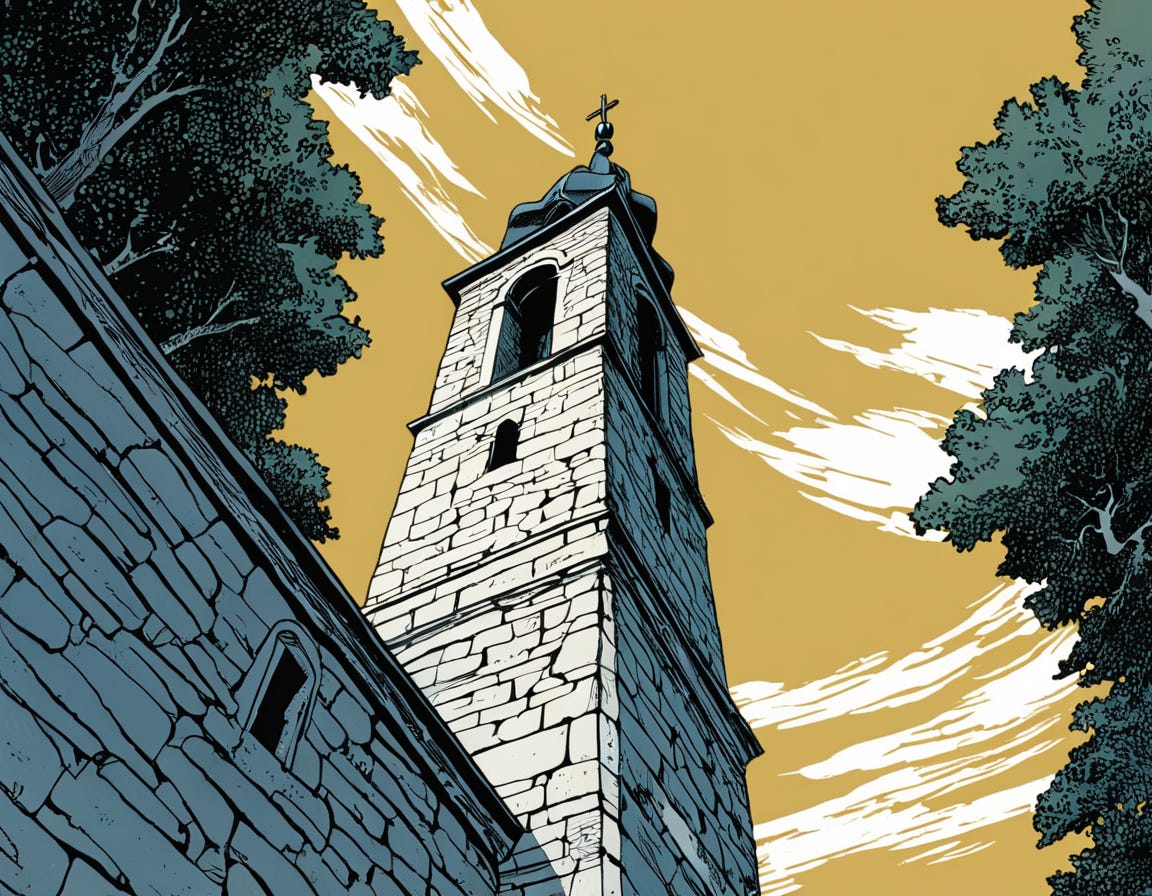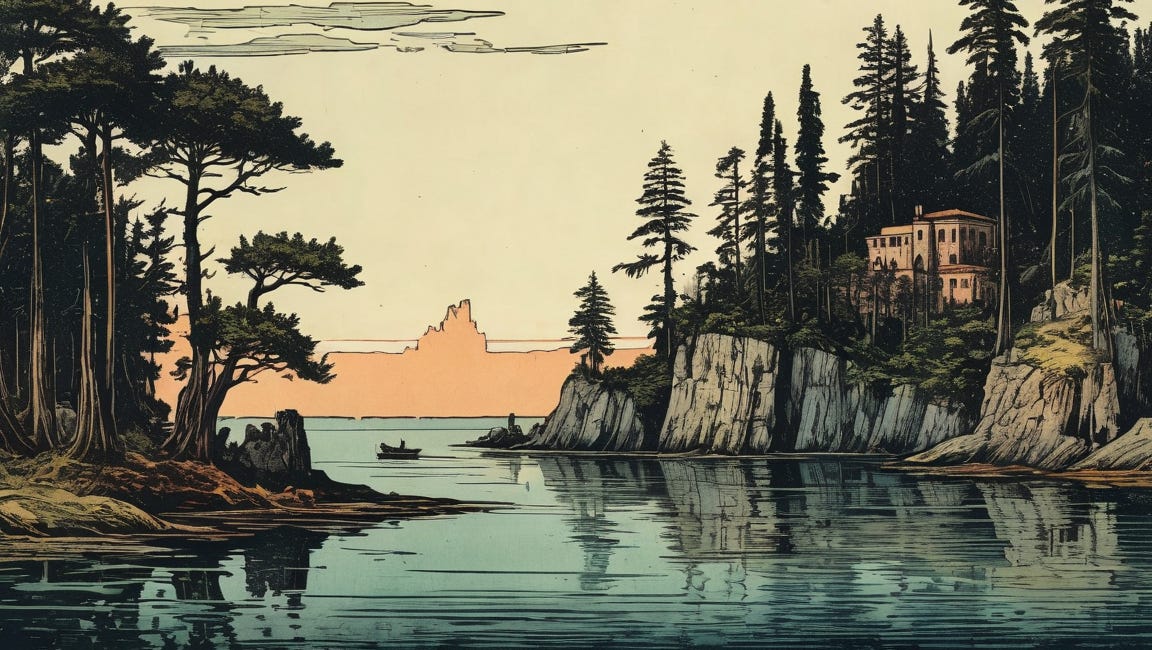On a dusty shelf of some old store, a Baedeker, left in our universe by a traveler from another, waits to be discovered by that most patient and intrepid of explorers: the reader.
In the 18th year of my exile, I fell in with a Brabian woman who was neither wholesome nor pleasant but who evinced in me a kind of dread of all possibilities but herself. I had been so long without romance that I feared my potential for it was waning, and even though I secretly felt I deserved better, it seemed to me her sudden appearance in the bleak halls of my life was a sign and that if I let her go, I would regret it when someone worse came along. Thus, I was for a time able to faithfully look on the woman I then courted as if she were the very best that life had to offer. She was flattered at first, although that did less than I expected to hold her attention, but by the start of our second year of courtship, before which I had promised to marry her, she came to intuit that I still harbored secret dispositions. She attributed my false affection to desperation rather than melancholy, and I came home one day to find a statue in flesh occupying my front door. When I protested, out of arm’s reach, that this brute was standing in my apartment, I was told he was the younger brother of my betrothed, who that day had married another man, and that my apartment was now theirs.
Her elder brother shouted this to me from inside as he went about loading a pair of suitcases, one of which was my own, with everything of mine he could find, along with anything of any real value, I believe with the intent to sell it. The fact I was a foreigner made finding work difficult, and I had been living for many months on others’ good graces. It was therefore not theft, my betrothed’s brother explained to me as he stuffed a pair of antique kratchniks, the only heirlooms of my family, into my suitcase. Rather, it was the collection of a debt and would be explained as much to the authorities, if I wished to involve them. I was assured my betrothed’s brothers did not and that it would be better for everyone if I simply left town. It didn’t seem possible, but I was being exiled from exile.
After they left, I emptied my pockets at the corner restaurant and sulked at a small round table, where the mirrors behind the bar and in the little alcoves in the wall, which I had never before much noticed, mocked me with my own discountenance. I had no money, having just poured the last of mine into a glass, and also no clothes and no place to sleep, and I wondered at the possibility of suicide. I did not seriously contemplate it. I contemplated whether I had the guts for it, or for anything for that matter. And when the reflection at the bottom of my empty glass jeered at me that the answer was no, I felt a great shame and set out then to prove the bastard wrong. I scaled the spiked fence of the Astraggia, tearing my suit in the process, and climbed the steps to the bell tower, where I intended to fall off swiftly and with no drama. I had decided that if I closed my eyes and let myself fall backward, then I would see nothing of the ground that waited for me and thereby gain a moment on my nerves. By the time they inevitably failed, there would be nothing left to grab and I would be committed in my endeavor as I had been rarely committed to anything.
I was dismayed, however, to find no less than four other fellows already standing precariously atop the bell tower, one on each wall. It being a narrow structure, there was no place left for me. I don’t know who arrived first nor how long any of them had stood there, but after a short wait, it became clear their nerves were no better than mine and the line was in no danger of moving soon, and I began to shift my weight and make small sounds of annoyance. Who were these fools selfishly siphoning the resolve I had drained so many glasses to find? The longer I waited, the surer I was to fail at this, too! So, I coughed and cleared my throat to break the pre-dawn silence and remind each of them that there were others waiting.
After some twenty minutes, I heard the sound of heavy panting, and a plump man appeared behind me on the steps, dabbing his brow with a handkerchief. Even as heavy as he was, he seemed to have lost a great deal of weight recently as the suit he wore hung off him indecisively. He glanced at the wide flap of my torn jacket and we made eye contact briefly. It seemed he was not the least bit surprised or bothered that there was a line for that platform of death. Reading the look of incredulity on my face, he explained to me that there was often a line on Thursdays. I did not want to talk—I wanted to keep burning holes in the backs of the men above with my gaze—but the fat man’s statement intrigued me, and after a moment, I wondered aloud at the cause, and we began to speculate. Fridays seemed unlikely, we agreed, seeing as how that was the start of the weekend. If one was going to kill oneself, there was no point in doing it on the eve of leisure. Sunday evening, then, seemed the next logical choice. But Sunday was the Lord’s day and suicide a sin. I admitted that such a thing would even give pause to an unbeliever, such as myself, if only because waiting until morning cost nothing and was therefore worth the price to mitigate even the remotest risk of being wrong. Besides, after having just enjoyed a couple days off, there would likely be some semicolon of doubt inserted into the sentence of one’s life. What harm was there in returning to work on Monday, if only to prove to yourself that you genuinely wanted it to end?
We were just beginning our analysis of Tuesdays when we were asked by one of the fellows on the wall if we wouldn’t mind taking our conversation elsewhere, which we did. My portly friend was not, it seemed, in nearly as dire straits as I, and he offered a drink. Since I had long lost the resolve I had found at the bottom of the glass, I was anxious for a refill, and he took me to an all-night café by the sea where sailors nurtured hangovers and prostitutes wandered about tempting their last pennies from them. We found a table near the back door with a fine view of the dock where ships rocked and ropes creaked. It was clear my friend had a secret he was desperate both to reveal and to hide. With each drink, he would divulge a small piece of the whole only to grab my arm and make me swear to forget it. So it was I learned he was a merchant clerk who had, against the law, secretly invested heavily in one of his employer’s adventures. They had received word that afternoon that the ship had sunk off the coast of Astartia, possibly as a result of a Celf attack, and that as such the matter was being investigated by the authorities, who were sure to find evidence of his malfeasance. Not only was he about to lose his livelihood, he would almost certain go to jail. He was newly married, he explained, and had only succumbed to foolishness in order to provide for his wife, who had been hinting for weeks that she might be with child. Was she not a kind woman, I asked, gracious of spirit, who would forgive him this first folly on account of its noble cause? No, he explained. His wife was a tightfisted Brabian who had only recently, and finally, left another courtier, who was apparently a foreigner like myself, and also feckless and whining and not at all courageous as I had been, standing resolutely on the bell tower, ready to throw myself off.
Of course, my skin prickled at his words. I asked my new friend what he intended to do, now that his life was surely over. After turning to ensure we were not overheard, he lowered his head to the table and admitted to me he had not gone to the bell tower to commit suicide but to find a man such as myself who was possessed of nothing in the world but the strength to do it. As a clerk of soon-to-be-ill-repute, his only hope of avoiding a lengthy jail sentence was to capitalize on the secret he alone was prepared to reveal. His employer, while speaking to the Admiralty in his office, had let slip within earshot of the door that there had been a great deal of Atlantium on board the sunken vessel, and that the captain had orders to dump it at the first signs of trouble. It would not, therefore, be found on the reef with the wreckage, but likely further out to sea. The clerk had been ordered to gather all materials on the voyage and deliver them to the Admiralty that very day, which he had, but not before removing a single thin strip of paper into which a series of holes had been punched. The holes were of two sizes, and their varied order revealed information from radio bursts that only a trained naval man could read. It was the ship’s last transmission, and since it would take the admiralty a few days to analyze and reconstruct the information in the file (which was missing the tape, and which had also been provided quite out of order), there was more than enough time to steam their way ahead of the navy and recover the Atlantium!
I objected immediately that the Admiralty of any nation would never let such a prize simply disappear, but my friend was undeterred. It was not necessary, he explained, to retrieve the entire shipment. A single case would more than suffice to turn us both into kings. Since it had been dumped at great depth, and since the bulk of the shipment remained, the navy would never assume theft. The loss of a single case would be blamed on the sea. After all, the crew were all dead, and the navy had no reason to expect anyone but the clerk’s employer knew of the vessel’s secret cargo. And in any case, what did such risk matter to me? Was I not the courageous man who moments before stood ready to throw himself from the top of the bell tower? What was a few days more to such a staunch captain of his own fate? Was not the manner of my death a matter of my choosing and mine alone? If the adventure was successful, I would have reversed my fortunes in so grand a manner as to make life itself unrecognizable. And if it failed, the bell tower would remain.
I did not immediately accept but sat watching the ships rocking at dock. A wind had arrived to sprinkle drops of rain on the flagstones. Was it possible this was an accident? Was it possible the man across the table really was my betrothed’s new husband? Was it possible she had been carrying on with him for weeks or more? It seemed both unlikely and not. The face of my ruddy companion revealed all of his excitement—indded, it could not contain it—but no subterfuge. And yet, was I willing to risk everything on mere chance?
Over the sound of the waves, I heard the distant rime of the bell tower, calling the penitent home. There was no point in returning there now. Daylight had come, and I would be seen. It wasn’t only a sin to commit suicide, it was a crime as well. I lifted my glass and drained it in one go, catching my reflection in the bottom as I slammed it resolutely to the table. Alright, I said. I would do it. My new friend and I huddled together greedily and whispered plans to meet in one hour’s time. We would rendezvous where we met, under the old arch of the vestry, and from there, we would begin our adventure!
But he did not find me at the arch. I watched from the top of the bell tower as the Pax Regarda leapt from their hiding places at his arrival and arrested him. He was confused at first. His head spun his wide eyes in every direction, and the fat on his face struggled to keep pace. Finally, he understood that I had betrayed him. Of course I had! The Regarda pay a thousand silver guiya for reliable information about traitors. How do you think I had wound up in exile? Once they discovered the paper communique in the code of the Admiralty, his fate was sealed, and I collected a beautiful promissory note that the bank exchanged for coin that very morning. It was orders of magnitude less than I would’ve gotten for a chest full of Atlantium, but it was more than enough for a nice meal, a new suit of clothes with matching shoes, and a deposit on a new apartment. To think that I would want to go on an adventure. Me! If Fate would conspire to make me work, then I would show her!
I’m told my betrothed was beside herself when the news came. Her brutish brothers, it seemed, had also had some role in the plot and were arrested shortly thereafter. Or perhaps my plump companion fingered them out of spite. (I’m sure he felt about them the same as I.) Either way, I had to thank him. Not only did he rid me of that awful Brabian woman, he had found me gainful employment. Every Thursday evening—it had to be Thursday—I donned my new suit and polished shoes, climbed the steps of the bell tower, and waited for the first man to arrive. They were always surprised to see me and stopped suddenly on the stairs before glancing down. If they were dressed lesser than I was, I would explain that it only took a single silver guiya to convince me not to report them to the authorities. If they were dressed greater, I would charge more and even walk them home—for safety—so that I knew where they lived and could check on their welfare later. When I did, they were only too happy to pay me to leave.
After a few months, word spread, and I climbed the steps of the bell tower to discover someone else in my place, a thin man with a very large attendant who took my jacket and shoes, threw me down the stairs, and told me never to return. I had been out-racketed by a professional. But it did not matter. By then, I had saved enough to invest in several firms that contracted with the Imperial Navy, which had recently come into possession of a large quantity of Atlantium. The dividends I earned kept me in a lifestyle such that I could finally marry a hostess from Evolta and retire to the waterfront casino at Tiest.
The City of the Dead
On a dusty shelf of some old store, a Baedeker, left in our universe by a traveler from another, waits to be discovered by that most patient and intrepid of explorers: the reader.





